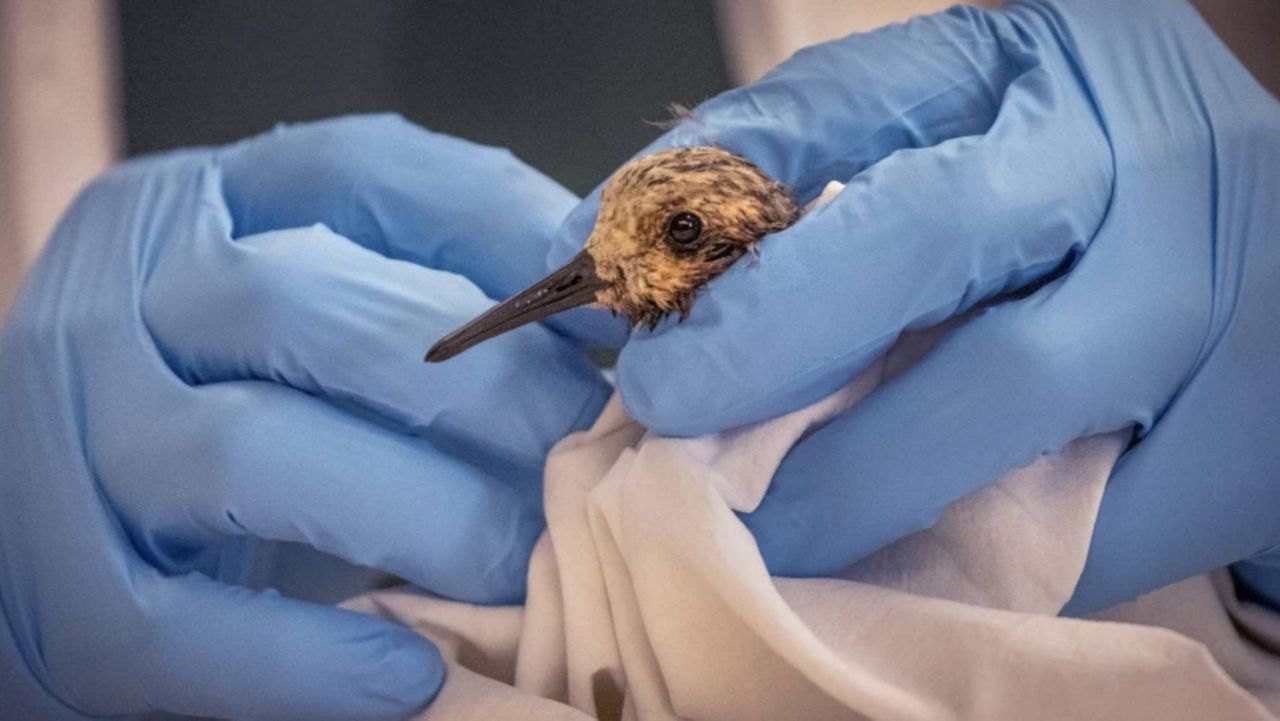The oil spill off the Orange County coast is affecting SoCal's beaches, estuaries and wetlands.
Now, a frantic race is on to save the wildlife whose habitats are now slick with oil.
In an interview for "LA Times Today," metro intern Robin Estrin joined host Lisa McRee with the story.
What You Need To Know
- The oil spill off the Orange County coast is impacting SoCal's beaches, estuaries and wetlands
- And now, a frantic race is on to save the wildlife whose habitats are now slick with oil
- Although people are being asked to stay away from the impacted areas, there are ways to help
- Donors can drop off supplies or give cash donations to the Bolsa Chica Conservancy in Huntington Beach or the Pacific Marine Mammal Center in Laguna Beach
The Orange County coast is home to stretches of beach and sensitive ecosystems such as the Talbert Marsh in Huntington Beach and the Bolsa Chica Lagoon.
"Talbert Marsh is a 25 acre restored wetlands home to more than 80 different species of birds, including blue herons, brown pelicans, double-crested cormorants and Western gulls. And reports on Sunday showed that oil had infiltrated the Talbert Marsh," Estrin said.
Often, birds are the first victims of an oil spill, and that oil affects their bodies in various ways.
"Birds are often the first victims of oil spills because they spend the most time on the water surface where the oil is congregating. There are diving through its toxic sheen to eat food and gliding across the surface of the water. These birds' feathers have a complicated microstructure like Velcro, and when those feathers are aligned, they keep that bird waterproof and warm. When oil penetrates the feathers, it disturbs that microstructure and allows for cold, oily water to seep into the bird's feathers and toward their skin, which makes them very cold. It increases their metabolic rate and puts them in a lot of distress, so they often waste away is really the term that experts use to describe what happens to these birds caught out on the water freezing. And they must come to shore to stay warm, but they feed in the ocean. So, it's this kind of double whammy of harm when a bird is coated with oil. It attempts to preen itself to clean the oil from its feathers and, in doing so, ingests oil. And, of course, this can cause dizziness and vomiting. But a more sinister impact of this is that the oil begins to coat the stomach and the gastrointestinal of the bird, preventing it from absorbing nutrients and water," Estrin added.
According to Estrin, the people in charge of cleaning the birds describe it more as an art than a science.
"Essentially, birds are placed in tubs of warm water and dishwashing liquid. The water is agitated to make sure that soapy water infiltrates the feathers to try and return that microstructure to normal. It can take a heavily oiled bird that might need to be placed in 15 to 20 warm water baths to remove all that oil. Once the oil is removed, the soap begins to disturb the microstructure of the feathers, so the person cleaning the bird must then rinse this bird thoroughly using pressurized nozzles at 20 to 50 pounds per square inch. As they rinse the soap from the bird, the microstructures of the feathers start to realign, and these people who are cleaning the birds describe it as rinsing a bird dry."
Regarding the safety of larger animals like whales and dolphins, they can easily swim away, but smaller creatures have nowhere to go.
"Larger mammals can temporarily find different habitats after an oil spill. Birds, as we know, are heavily affected, but they also can be cleaned. What can't be cleaned are the organisms and creatures that live in the swash zone of the ocean, right where the waves crash onto the shore. Those are organisms like sand crabs and mole crabs, worms and clams. Nobody cleans those, and those are at the base of the ecosystem of the ocean," Estrin said.
Officials collected weathered oil, which looks like gooey balls mixed with sand called "cookies." Estrin said they are very toxic.
"Yeah, these are softball-sized clumps of oil that have been washing onto the shore. They're less toxic in their current form. But when they're broken apart by animals or humans, they begin to release more toxins and become more toxic to creatures."
Authorities said there is no fishing allowed right now, and if someone sees an animal covered with oil, they are asked not to help it or get near it.
"We don't know the long-term impact of oil on the fishery system. It's best to stay away from the fish right now, and it's certainly best to leave caring for oiled, covered birds to the experts. There is a phone number for the Oiled Wildlife Care Network, which is responsible for collecting oiled birds. And it is recommended to call that number if you see a creature on the beach," Estrin added.
Watch "LA Times Today" at 7 and 10 p.m. Monday through Friday on Spectrum News 1 and the Spectrum News app.
